The Effect of Ethanol Extract for Tamarindus indica L. Leaves and Capparis spinosa L leaves in Fighting Culex pipiens (Diptera: Culiciae) under a Laboratory Conditions
Keywords:
Extracts, Tamarindus indica L, Capparis spinosa L, larvae, Culex pipiens mosquitoAbstract
This research was conducted during the second semester of 2017 in the Biology Laboratory / Faculty of
Education / Radfan - University of Aden, in order to study the effect of the extract of raw ethanol
extracted from the leaves of the tamarind plant T. indicaL. and the plant C. spinosa L as a pesticide
against the first ,second , third and the fourth larvae of C. pipiens mosquitoes with the concentrations
(2500, 5000, 7500 ppm).After 48 hours of treatment, the mortality of mosquito larvae were takenThe
results of the experiment indicated that the crude ethanol extract of the plants leaves have had good
properties for the eradication of C. pipiens in the tested concentrations. The extract of the tamarind
plantleaves exceeded the extract of the capers plant leaves and produced the highest lethal activity, the
mean mortality rates for the extract type 64.37 and 49.0 % showed statistical differences at a significant
level of 5%. The interaction of crude plant extracts and concentrations resulted in a dose-dependent
mortality rate (95.75 and 80.50 %) at the highest concentration used for both extracts respectively.The
tested larvae showed different levels of sensitivity to the type of plant extract - and that the first larvae
were the most affected ones at the whole concentrations used and reached 100 , 89 % at the lowest
concentration and the mortality mean at age 4 was the highest at and 88 , 64% respectively. All the values
of the statistical analysis were of a great importance at a significant level of 5%. No mortality were seen
in control treatment. The increase in the concentrations of the crude extracts enlarged the mortality rates
in the average larval age of the tested larvae, ranging between (59.88 - 88.12%). This study presents the
first report on the activity of ethanolic extracts of two plants against Culex pipens in local conditions.




